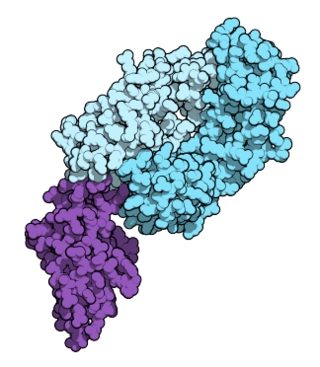Related Research Articles

Cetuximab, sold under the brand name Erbitux, is an epidermal growth factor receptor (EGFR) inhibitor medication used for the treatment of metastatic colorectal cancer and head and neck cancer. Cetuximab is a chimeric (mouse/human) monoclonal antibody given by intravenous infusion.

Targeted therapy or molecularly targeted therapy is one of the major modalities of medical treatment (pharmacotherapy) for cancer, others being hormonal therapy and cytotoxic chemotherapy. As a form of molecular medicine, targeted therapy blocks the growth of cancer cells by interfering with specific targeted molecules needed for carcinogenesis and tumor growth, rather than by simply interfering with all rapidly dividing cells. Because most agents for targeted therapy are biopharmaceuticals, the term biologic therapy is sometimes synonymous with targeted therapy when used in the context of cancer therapy. However, the modalities can be combined; antibody-drug conjugates combine biologic and cytotoxic mechanisms into one targeted therapy.
Panitumumab, sold under the brand name Vectibix, is a fully human monoclonal antibody specific to the epidermal growth factor receptor.

Pertuzumab, sold under the brand name Perjeta, is a monoclonal antibody used in combination with trastuzumab and docetaxel for the treatment of metastatic HER2-positive breast cancer; it also used in the same combination as a neoadjuvant in early HER2-positive breast cancer.
Bavituximab (PGN401) is a human-mouse chimeric monoclonal antibody against phosphatidylserine, which is a component of cell membranes that is exposed when a cell is transformed into solid tumor cancer cell or dies, and when cells are infected with hepatitis C. The process of cell death is highly controlled and so there usually no immune response to phosphatidylserine but when bavituximab binds to it, the conjugate appears to stimulate an immune response in humans.

Bivatuzumab mertansine is a combination of bivatuzumab, a humanized monoclonal antibody, and mertansine, a cytotoxic agent. It is designed for the treatment of squamous cell carcinoma.
Bivatuzumab is a humanized monoclonal antibody against CD44 v6.
Ocrelizumab, sold under the brand name Ocrevus, is a medication used for the treatment of multiple sclerosis (MS). It is a humanized anti-CD20 monoclonal antibody. It targets CD20 marker on B lymphocytes and hence is an immunosuppressive drug. Ocrelizumab binds to an epitope that overlaps with the epitope to which rituximab binds.
Nimotuzumab is a humanized monoclonal antibody that as of 2014 had orphan status in the US and EU for glioma, and marketing approval in India, China, and other countries for squamous cell carcinomas of the head and neck, and was undergoing several clinical trials.
Figitumumab is a monoclonal antibody targeting the insulin-like growth factor-1 receptor that was investigated for the treatment of various types of cancer, for example adrenocortical carcinoma and non-small cell lung cancer (NSCLC).

Symphogen is a biotechnology company located in Copenhagen, Denmark that develops protein drugs based on recombinant monoclonal antibody mixtures. These drugs are different from the polyclonal antibodies, as each antibody in the mixture is produced from one carefully selected clone. Their three main areas of therapeutic research are immunoglobulin replacement, cancer, and infectious diseases. The company was founded in 2000 and has patents on a drug discovery platform called Symplex and a drug manufacturing platform called Sympress. By 2009, ten drugs were being developed with rozrolimupab (Sym001) being the lead product. Laboratoires Servier acquired Symphogen in 2020.
Glembatumumab vedotin is an antibody-drug conjugate (ADC) that targets cancer cells expressing transmembrane glycoprotein NMB (GPNMB).

John Mendelsohn was a president of the University of Texas MD Anderson Cancer Center in Houston. He was an internationally recognized leader in cancer research.

Nivolumab, sold under the brand name Opdivo, is a medication used to treat a number of types of cancer. This includes melanoma, lung cancer, malignant pleural mesothelioma, renal cell carcinoma, Hodgkin lymphoma, head and neck cancer, urothelial carcinoma, colon cancer, esophageal squamous cell carcinoma, liver cancer, gastric cancer, and esophageal or gastroesophageal junction (GEJ) cancer. It is used by slow injection into a vein.
Lirilumab (INN) is a human monoclonal antibody designed for the treatment of cancer. It binds to KIR2DL1/2L3.

Pembrolizumab, sold under the brand name Keytruda, is a humanized antibody used in cancer immunotherapy that treats melanoma, lung cancer, head and neck cancer, Hodgkin lymphoma, stomach cancer, cervical cancer, and certain types of breast cancer. It is given by slow injection into a vein.
Seagen Inc. is an American biotechnology company focused on developing and commercializing innovative, empowered monoclonal antibody-based therapies for the treatment of cancer. The company, headquartered in Bothell, Washington, is the industry leader in antibody-drug conjugates or ADCs, a technology designed to harness the targeting ability of monoclonal antibodies to deliver cell-killing agents directly to cancer cells. Antibody-drug conjugates are intended to spare non-targeted cells and thus reduce many of the toxic effects of traditional chemotherapy, while potentially enhancing antitumor activity.
Varlilumab is a monoclonal antibody designed for immunotherapy for solid tumors and hematologic malignancies. It is an anti-CD27 antibody and helps activate T-cells.
Cofetuzumab pelidotin is an experimental antibody-drug conjugate in development for the treatment of cancer. It was created by Stemcentrx and is being developed by Pfizer. The drug is an anti-PTK7 monoclonal antibody linked to auristatin-0101, an auristatin microtubule inhibitor.
Roy S. Herbst is an American oncologist who is the Ensign Professor of Medicine, Professor of Pharmacology, Chief of Medical Oncology, and Associate Director for Translational Research at Yale Cancer Center and Yale School of Medicine in New Haven, Connecticut.
References
- ↑ World Health Organization (2011). "International Nonproprietary Names for Pharmaceutical Substances (INN). Proposed INN: List 106" (PDF). WHO Drug Information. 25 (4).
- ↑ Horinouchi H (December 2016). "The prospect of patritumab for treating non-small cell lung cancer". Expert Opinion on Biological Therapy. 16 (12): 1549–1555. doi:10.1080/14712598.2016.1249846. PMID 27744717. S2CID 4035336.
- ↑ Clinical trial number NCT02633800 for "A Clinical Trial Using Patritumab or Placebo in Combination With Cetuximab and a Platinum Agent for Patients With Squamous Cell Cancer of the Head and Neck" at ClinicalTrials.gov
- ↑ "Anti-HER3 Monoclonal Antibody Patritumab Selected for I-SPY 2 TRIAL in Breast Cancer". October 2016.